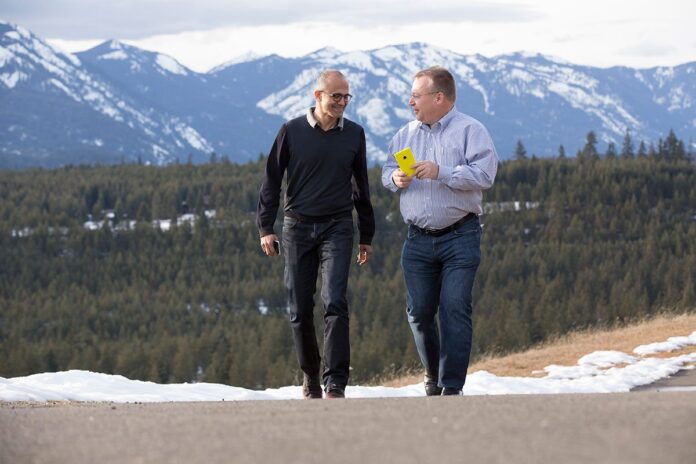Microsoft’s latest attempt to turn around its flailing mobile operations is set to cost 18,000 employees their jobs, with most of those cuts coming from its recently acquired Nokia handset division.
The computer software giant announced today that its “restructuring plan” was designed to “simplify its organization and align the recently acquired Nokia devices and services business with the company’s overall strategy.” That restructuring will see 12,500 “professional and factory positions” cut through “synergies and strategic alignment of the Nokia devices and services business.” The cuts are set to be completed by mid-2015.
Microsoft said it would take between $1.1 billion and $1.6 billion in pre-tax charges over the next four years related to the job cuts, with up to $800 million related to severance and related benefit costs, and up to $800 million of “asset-related charges.” Microsoft announced plans to acquire Nokia’s handset business last September for $7.2 billion, a deal that was consummated earlier this year. At that time, Microsoft said approximately 32,000 Nokia employees would move over, with about 4,700 employees slated to remain in Finland.
In an e-mail to employees, recently installed CEO Satya Nadella tried to put a positive spin on the proceedings, noting the plan would allow for a more integrated and agile competitor in the market.
“My promise to you is that we will go through this process in the most thoughtful and transparent way possible,” Nadella explained. “We will offer severance to all employees impacted by these changes, as well as job transition help in many locations, and everyone can expect to be treated with the respect they deserve for their contributions to this company.”
In addition to job cuts in the Nokia division, Nadella said the company would shift the current Nokia X product line that relies on Google’s Android operating system back towards Microsoft’s Windows Phone OS, and that it will further integrate Microsoft’s “digital work and digital life experiences” in targeting the higher-tier device market. Nokia unveiled the X lineup earlier this year in an attempt to tap into the substantial Android ecosystem that currently dominates the smartphone world.
One analyst predicted that Microsoft’s move would eventually lead to the company spinning off the entire Nokia handset business, citing a similar roadmap to what Google had done with its Motorola Mobility acquisition earlier this year.
“This is the first volley in Nadella’s restructuring of Microsoft,” noted Jack Gold from J. Gold Associates. “He realizes he is not Apple and should not be competing in [hardware] directly with [original equipment manufacturers]. Further, phones is a razor-thin margin business and makes little sense to be in if you are interested in profit margins approaching what Microsoft is used to in the [software] business. I expect that Microsoft will either spin out or sell off the phone business within 18 months. They are making the same mistake that Google did when it bought Motorola (and ultimately sold it to Lenovo). As a first step, Nadella is refocusing Nokia phones away from the lower-end X devices, going all-in on Windows Phone. That is a sound strategy for positioning the product set to meet Microsoft’s need for more market share of Windows phone, but it’s unlikely to be very successful in greatly increasing market share. But this repositioning in my opinion is a first step down the path of making the phone business ‘saleable’.”
Microsoft’s efforts in the mobile telecom space have lagged over the past several years as Apple and Google managed to push aside the software company in gaining a stranglehold in the OS space. Prior to the launch of Apple’s iconic iPhone in 2007, Microsoft was seen as a major player in the burgeoning smartphone space that to that point was dominated by Research In Motion’s BlackBerry and Palm’s devices and operating systems.
Nokia, which held the title of the world’s No. 1 mobile device makers for years, also seemed to miss the smartphone boat as it continued to rely on the Symbian OS, which did not manage to gain traction outside of Europe.
Microsoft did manage to hold some influence in the enterprise space as corporations appeared more comfortable in running mobile systems that were compatible with their desktop OS environment. However, that leadership has been sinking as enterprises began adopting a “bring-your-own-device” model for their employees that led to growing support for more consumer-friendly devices and operating systems from Apple and Google.
Earlier this week, Apple took another bite into the enterprise market, announcing a deal with IBM to partner on integrating Apple’s devices and OS into IBM’s cloud services platform.
Bored? Why not follow me on Twitter?

Microsoft to slash 18,000 jobs, two-thirds from Nokia handset division
ABOUT AUTHOR
